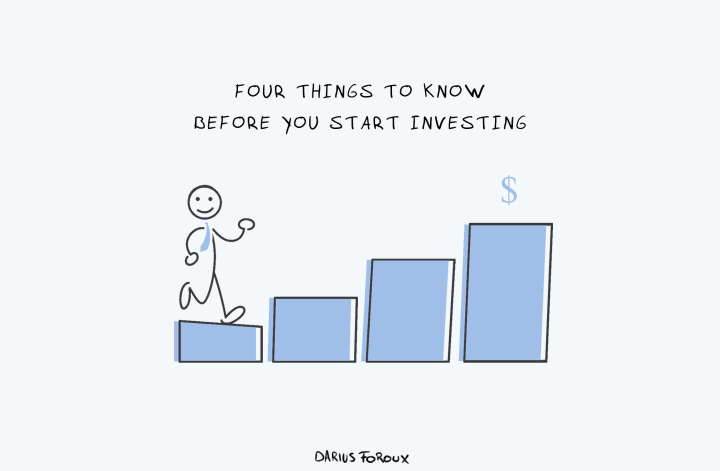Do you sometimes get the feeling that you need to spend? Sometimes, and particularly when I get paid, I feel like buying something, anything. It’s no surprise that Americans spend an average of $314 every month in impulsive spending.1Source: Statista
This could be any purchase you made without planning to. Like adding a few snacks outside of your grocery list at the cashier. Or visiting a clothing shop “just to browse” and then going out with a brand-new jacket. Or even “treating yourself” to an expensive dinner after a stressful day at work.
Society has trained us to believe that we need to treat ourselves by spending our money. How does that work? You work hard to earn and then you spend that money in a few minutes? How does that give you satisfaction?
I’m not saying all impulse purchases are bad. They’re a natural part of life. But when things get out of control, your impulsive spending habits will destroy your finances and prevent you from building wealth.
Just imagine if you invested that $314 every month into the S&P 500 index for 10 years. With the S&P’s average annual rate of 11%, you’d have over $68,000! There’s nothing like the power of compound growth to put things into perspective.
So how do we manage our impulsive spending habits? Simple: Always consider the emotional aspects of your finances.
Because personal finance is not a mathematical or logical concern — it’s emotional. Humans spend based on their emotions, even when they involve logic.2Source: Ramsey Solutions
For example, I bought the AirPods Max not long ago. You know, those $600 pair of Apple noise-canceling headphones. I used it for a few days and they were great. But it wasn’t any different than my other noise-canceling headphones. I thought, “Why did I buy this thing!? I already HAVE one!”
Sometimes, we really don’t put much thought into our purchases. Eventually, I returned the product.
Here are 4 habits I’ve formed that helped me to control impulse buying.
1. Calmness
When you’re too caught up with your desires and wants, you become susceptible to impulsive purchases. But when you’re calm, your initial response to something you see is relaxed and not, “I WANT THAT!” Seneca said it well:
“No man, however, enjoys a blessing that brings anxiety; he is always trying to add a little more.”
A lot of the things come with hidden costs. Think about buying a new phone: It will likely need a new phone case, and a newer set of headphones so you can maximize its features. Or if you’re switching from Android to the Apple ecosystem; you’ll likely want to replace your laptop and smartwatch with Apple products too.
So it’s all about mindfulness. By giving yourself the space to think through your purchase, you can determine if you really want or need something first before buying it.
2. Being moderately analytical
People who analyze everything usually take it too far, which leads to analysis paralysis. The other end of the spectrum (purely buying on instinct) is also not good.
However, being moderately analytical is a highly useful trait. You analyze your desires and impulses by adding an extra step before you act. Simply ask yourself:
“Why do I want to buy this thing?”
If you’re buying it for the benefit of other people, like getting an overpriced car just so your friends and colleagues think you’re a success, then I don’t recommend it. As much as possible, only buy something because you really need or want it for yourself.
3. Delaying purchases
Good things take time. Sometimes we get impatient and we want things now, now, now. This is the way to impulse purchases that we regret later.
So the next time you’re in (or near) a store and you didn’t plan to buy something, commit to following through on your intention. Don’t buy! Even if you see something you want, give it time. If you really want or need to buy something, you can always come back to buy it.
Remember: We live in a capitalistic society. Products will be there. Things will go on sale in the future. You’re not missing out on anything.
4. Self control
This one is obvious. Self-control is one of the most important personality traits in life. Think of the famous marshmallow experiment3Source: Simply Psychology, where the kids who had the most self-control showed better odds of success than the ones who didn’t.
If you can control your urges to spend on things you encounter, you will feel better about yourself. Remember that self-control is like a muscle. The more you use it, the better it becomes.
First, start with small things. Like avoiding “small” treats at the grocery store that you didn’t really plan to buy. After a while, you can resist everything.. if you want.
Because after all, it’s your money. You can do what you want. But the decisions should always be in your own hands.
Slow down
Every day, you’ll find offers that are only valid for “limited time only.” And there’s truth in it. But the real truth is this: Our time is limited.
And that’s exactly why we need to get clear on what truly matters to us.
Because when you know what you want, these false time constraints that marketers like to use will cease to take hold of you.
People sometimes go through life like a bulldozer. That’s where mindfulness comes in. Always try to take a step back and ask yourself:
“Do I really want this right now? Can this wait?”
And whenever you buy something that you realize you don’t need — build the habit of returning it. It might be a little inconvenient.
But once you have this in your system, you tend to become more careful with your buying decisions. Because you know you’ll take the inconvenient route of returning it.
When you slow down, you avoid impulsive spending and save money you can use for better things.




